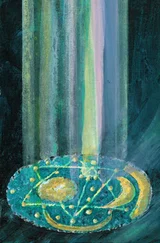“Come over here, sailor,” a voice said.
A figure in officer’s suntans was squatting down at the side of the gedunk. His back was to me, but I knew it was Captain Pritchett. He looked up.
“Give me a hand, here,” he said.
“Yes, sir,” I said, and wondered if I should salute and decided not to. He was digging in the earth around a bush. There was a large empty earthenware pot beside him. He handed me a small digging tool.
“Now dig on that side, see? But don’t hit the roots. I’m gonna save this baby.”
I started digging carefully in the dim light, feeling with my hand for the roots of the bush.
“This is oleander. The goddamned snowstorm practically killed her.”
Then he started talking to the bush. “But I’m gonna save you, ain’t I, honey? You been such a good girl. You been so put upon.” His voice was crooning, as if directed at a baby. “We gonna get you up and into a pot and up to the control tower, where there’s lots of sun. Give you lots of water to drink and keep your ass warm. You gonna live , honey. You ain’t gonna die next to no brick wall.”
We finished clearing the roots. He picked up a small paper bag and poured pebbles into the bottom of the pot.
“Now throw some of that dirt in there,” he said, the voice abruptly full of authority. He went back to the bush.
“Yes, sir.”
“And bring it over here, close to me. Yeah. That’s it. Okay … Now, while I hold her up straight, pack some dirt in there. Not too hard now. Easy. The dirt from the top, the real black stuff, not that sandy clay crap at the bottom. Yeah. Okay, that’s it. Good!”
He stepped back and gazed at the plant, looking happy. Then he was suddenly aware of me again, and fixed on my face.
“What’s your name, sailor?” he said curtly.
I told him.
“Well, thank you, Devlin. What are you doing out anyway? After the base has been secured?”
“I was visiting with the messcooks, sir.”
“Visiting with the mess cooks? You’re white , sailor!”
“I know, sir.”
“Well, what the hell you doin up there with that crazy bunch of galley slaves?”
“Listening to music, sir.”
He looked suddenly interested. “No kidding? What are they playing these days? I bet it’s not Glenn Miller or Bing Crosby anymore.”
“No, sir.”
“So what do they listen to?”
I smiled. “Well, there’s a group called Professor Longhair and the Shuffling Hungarians, and a guy named—”
He guffawed. “Professor Longhair and the Shuffling Armenians ?!”
“Hungarians, sir.”
“Jesus Christ. What else?”
I told him the names of the other singers and groups, while he asked me to grab one side of the pot and help carry it to his office. He repeated every name I gave him, as if memorizing them for a test. I told him about Bobby Bolden and how he should be given a band to play at the EM Club. He grunted, and repeated Bolden’s name, as we carried the pot together up the three steps of the Administration Building, grunting and straining. A Marine private snapped to attention at the door.
“Open all those doors to my office, Private,” Captain Pritchett said. The private led the way down a corridor to a corner office. He flicked on the lights, saluted again, and backed away as we entered the office with the plant. The room was very clean and sparsely furnished, except for the plants. They were everywhere. And I thought of all the flowers at Eden Santana’s trailer.
“Over here in the corner, Devlin. We’ll leave her until the morning and then I’ll have her moved to the tower.” We laid the plant down next to a window. He started crooning to it again. “Now you get a good night’s sleep, you hear me? And tomorrow you’re gonna live in the sunshine. Tomorrow, and for the rest of your life on this planet. You hear me, honey? You can bet on it.”
I gazed around the office. There was a bookshelf with framed photographs of the captain on the deck of a ship, the captain with a woman, the woman alone, the captain and the woman coming under an arch of swords held by midshipmen. There were a couple of books: The Ops Officers Manual, The Bluejackets’ Manual , various books of rules and regs from Bupers, How to Win Friends and Influence People , by Dale Carnegie. He glanced at the woman’s picture.
“That’s my wife,” he said in a flat voice. “She died.”
“Sorry to hear that, sir.”
“I was in love with her from high school and we got married during the war and after all that, all that damned worrying and me being torpedoed and all the rest of it, she went and died on me.”
He shook his head and turned to look again at the plant.
“She got me started on this stuff, the gardening,” he said. “When I came home from the war, she had the goddamnedest garden waiting for me. So I guess maybe, in some way, if I keep these things living, then she’s alive too. See that plant over there?” He pointed at a large green plant with leathery leaves. “That’s from our garden in Sausalito. After I sold the house, I took it with me. I know she’s alive in that one.”
He looked at me as if suddenly aware that he had revealed himself to me, that he was vulnerable. He saluted smartly. I returned the salute.
“Thank you, sailor,” he said.
It was a dismissal.
“And, sailor? If you say a word about any of this to anyone, I’ll ship your ass to the Fleet Marines.”
“I understand, sir.”
I started to leave.
“Professor Longhair and the Shuffling Albanians,” he said and chuckled. “Jesus Christ …”
“Hungarians, sir,” I said, and saluted again and went out into the night.
Then began the time of my education. Miles Rayfield taught me the secrets of drawing. Bobby Bolden taught me about music. And Eden Santana taught me about everything else. Sitting here now, on a motel balcony facing the enormous Gulf evening, I try to reconstruct those hours, and although many have vanished into the blur, all seem accounted for, too. I know that I worked every day at the Supply Shack and stood my watches at the dumpster and was soon trusted with being the duty storekeeper. I know I did what I could to be a four-oh sailor and keep out of the way of Red Cannon. But I don’t have a series of sharp pictures of all those moments: What I saw and what I did are still at war with the way I felt.
And most of those feelings are tangled up with the time of Eden Santana. All those Saturday nights and Sunday mornings. And some sweet and timeless Sunday afternoons. I was always with her on Tuesday and Thursday nights, too, unless I pulled duty at the Supply Shack, because Eden didn’t work on those nights; even today, there is something oddly thrilling and poignant to me about meeting a woman on one of those weekday evenings. Eden worked late on Wednesdays and Saturdays, and though I could have spent each night with her, waiting at the trailer, she told me early on that it would be better if we didn’t fall into too rigid a routine. “You’re special, child,” she said. “I don’t want you ever to become ordinary.” And then touched my face and added, “Or me to be ordinary for you.”
That was never to happen. On some of those nights when I wasn’t with her, I began to feel the presence of what I called The Boulder. The true word was jealousy, but I couldn’t admit then that I could be shaken by a feeling that made me laugh when I saw it in movies or comics, or read about it in books. A real man wasn’t supposed to feel jealous of a woman any more than he could admit to being afraid. But on some lonesome nights I could feel The Boulder pressing up out of my guts, or coming down upon me from outside, filling the room like the giant orange in Miles Rayfield’s painting. I would hear a scrap of music, the rattle of the palms, smell the odor of the captain’s flowers, and Eden would appear in my mind. I would wonder what she was doing at exactly that moment. Sometimes I wondered if she was seeing Mercado, leading him (or someone else) into the holy precincts of the trailer. I would get physically sick then: nauseated, pouring sweat. I saw myself scaling the fence, heading into the night, jerking open the trailer door, confronting the two of them, the pictures of all this as vivid as a front-page photo, while my guts coiled and knotted until I fell into exhausted sleep. Then it would be a Tuesday or a Thursday or a Saturday night or a Sunday morning, and I would see her again, and it would all go away.
Читать дальше












